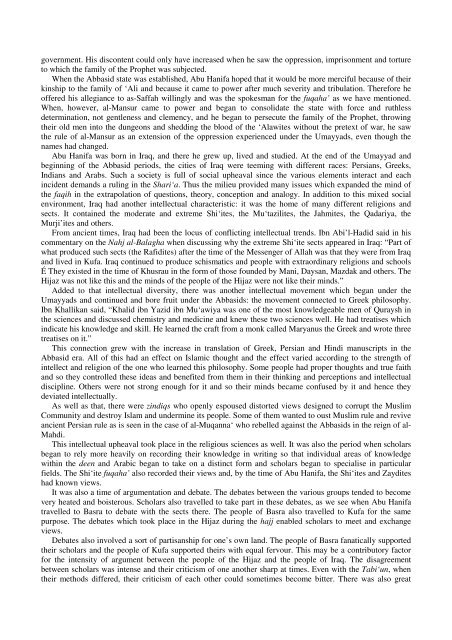You also want an ePaper? Increase the reach of your titles
YUMPU automatically turns print PDFs into web optimized ePapers that Google loves.
government. <strong>His</strong> discontent could only have increased when he saw the oppression, imprisonment <strong>and</strong> torture<br />
to which the family of the Prophet was subjected.<br />
When the Abbasid state was established, <strong>Abu</strong> <strong>Hanifa</strong> hoped that it would be more merciful because of their<br />
kinship to the family of ‘Ali <strong>and</strong> because it came to power after much severity <strong>and</strong> tribulation. Therefore he<br />
offered his allegiance to as-Saffah willingly <strong>and</strong> was the spokesman for the fuqaha’ as we have mentioned.<br />
When, however, al-Mansur came to power <strong>and</strong> began to consolidate the state with force <strong>and</strong> ruthless<br />
determination, not gentleness <strong>and</strong> clemency, <strong>and</strong> he began to persecute the family of the Prophet, throwing<br />
their old men into the dungeons <strong>and</strong> shedding the blood of the ‘Alawites without the pretext of war, he saw<br />
the rule of al-Mansur as an extension of the oppression experienced under the Umayyads, even though the<br />
names had changed.<br />
<strong>Abu</strong> <strong>Hanifa</strong> was born in Iraq, <strong>and</strong> there he grew up, lived <strong>and</strong> studied. At the end of the Umayyad <strong>and</strong><br />
beginning of the Abbasid periods, the cities of Iraq were teeming with different races: Persians, Greeks,<br />
Indians <strong>and</strong> Arabs. Such a society is full of social upheaval since the various elements interact <strong>and</strong> each<br />
incident dem<strong>and</strong>s a ruling in the Shari‘a. Thus the milieu provided many issues which exp<strong>and</strong>ed the mind of<br />
the faqih in the extrapolation of questions, theory, conception <strong>and</strong> analogy. In addition to this mixed social<br />
environment, Iraq had another intellectual characteristic: it was the home of many different religions <strong>and</strong><br />
sects. It contained the moderate <strong>and</strong> extreme Shi‘ites, the Mu‘tazilites, the Jahmites, the Qadariya, the<br />
Murji’ites <strong>and</strong> others.<br />
From ancient times, Iraq had been the locus of conflicting intellectual trends. Ibn Abi’l-Hadid said in his<br />
commentary on the Nahj al-Balagha when discussing why the extreme Shi‘ite sects appeared in Iraq: “Part of<br />
what produced such sects (the Rafidites) after the time of the Messenger of Allah was that they were from Iraq<br />
<strong>and</strong> lived in Kufa. Iraq continued to produce schismatics <strong>and</strong> people with extraordinary religions <strong>and</strong> schools<br />
É They existed in the time of Khusrau in the form of those founded by Mani, Daysan, Mazdak <strong>and</strong> others. The<br />
Hijaz was not like this <strong>and</strong> the minds of the people of the Hijaz were not like their minds.”<br />
Added to that intellectual diversity, there was another intellectual movement which began under the<br />
Umayyads <strong>and</strong> continued <strong>and</strong> bore fruit under the Abbasids: the movement connected to Greek philosophy.<br />
Ibn Khallikan said, “Khalid ibn Yazid ibn Mu‘awiya was one of the most knowledgeable men of Quraysh in<br />
the sciences <strong>and</strong> discussed chemistry <strong>and</strong> medicine <strong>and</strong> knew these two sciences well. He had treatises which<br />
indicate his knowledge <strong>and</strong> skill. He learned the craft from a monk called Maryanus the Greek <strong>and</strong> wrote three<br />
treatises on it.”<br />
This connection grew with the increase in translation of Greek, Persian <strong>and</strong> Hindi manuscripts in the<br />
Abbasid era. All of this had an effect on Islamic thought <strong>and</strong> the effect varied according to the strength of<br />
intellect <strong>and</strong> religion of the one who learned this philosophy. Some people had proper thoughts <strong>and</strong> true faith<br />
<strong>and</strong> so they controlled these ideas <strong>and</strong> benefited from them in their thinking <strong>and</strong> perceptions <strong>and</strong> intellectual<br />
discipline. Others were not strong enough for it <strong>and</strong> so their minds became confused by it <strong>and</strong> hence they<br />
deviated intellectually.<br />
As well as that, there were zindiqs who openly espoused distorted views designed to corrupt the Muslim<br />
Community <strong>and</strong> destroy Islam <strong>and</strong> undermine its people. Some of them wanted to oust Muslim rule <strong>and</strong> revive<br />
ancient Persian rule as is seen in the case of al-Muqanna‘ who rebelled against the Abbasids in the reign of al-<br />
Mahdi.<br />
This intellectual upheaval took place in the religious sciences as well. It was also the period when scholars<br />
began to rely more heavily on recording their knowledge in writing so that individual areas of knowledge<br />
within the deen <strong>and</strong> Arabic began to take on a distinct form <strong>and</strong> scholars began to specialise in particular<br />
fields. The Shi‘ite fuqaha’ also recorded their views <strong>and</strong>, by the time of <strong>Abu</strong> <strong>Hanifa</strong>, the Shi‘ites <strong>and</strong> Zaydites<br />
had known views.<br />
It was also a time of argumentation <strong>and</strong> debate. The debates between the various groups tended to become<br />
very heated <strong>and</strong> boisterous. Scholars also travelled to take part in these debates, as we see when <strong>Abu</strong> <strong>Hanifa</strong><br />
travelled to Basra to debate with the sects there. The people of Basra also travelled to Kufa for the same<br />
purpose. The debates which took place in the Hijaz during the hajj enabled scholars to meet <strong>and</strong> exchange<br />
views.<br />
Debates also involved a sort of partisanship for one’s own l<strong>and</strong>. The people of Basra fanatically supported<br />
their scholars <strong>and</strong> the people of Kufa supported theirs with equal fervour. This may be a contributory factor<br />
for the intensity of argument between the people of the Hijaz <strong>and</strong> the people of Iraq. The disagreement<br />
between scholars was intense <strong>and</strong> their criticism of one another sharp at times. Even with the Tabi‘un, when<br />
their methods differed, their criticism of each other could sometimes become bitter. There was also great














